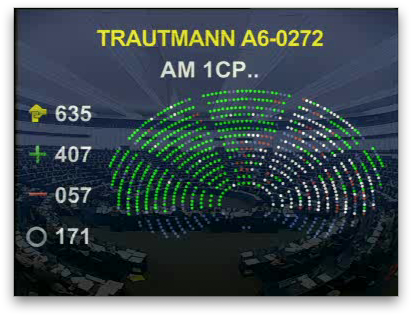Strasbourg, May 6 2009 − The debates on the Telecoms Package, thanks to a remarkable citizen mobilization, led to an extremely strong recognition of the access to internet as a fundamental right with the re-adoption of amendment 138/46 in second reading by a qualified majority. It is the final blow against three-strike laws such as Nicolas Sarkozy’s HADOPI bill, which are explicitely banned. The European Parliament nevertheless adopted a soft compromise on issues of network equity: no strong protection against “net discrimination” was adopted.

La Quadrature warmly thanks the numerous European citizens who have contributed to the possibility of this new and stronger than ever statement for fundamental rights. Even on issues connected to network offers, the worst provisions introduced since the beginning of the legislative process were not adopted. Thanks to the public debate, the ill-intended co-operation between ISPs and right holders and discrimination of Net services and contents will not be forced, even though doors are still open for introducing it in Members States.
“A formidable campaign from the citizens put the issues of freedoms on the Internet at the center of the debates of the Telecoms Package. This is a victory by itself. It started with the declaration of commissioner Viviane Reding considering access to Internet as a fundamental right1“The fourth element I would like to underline is the recognition of the right to Internet access. The new rules recognise explicitly that Internet access is a fundamental right such as the freedom of expression and the freedom to access information. The rules therefore provide that any measures taken regarding access to, or use of, services and applications must respect the fundamental rights and freedoms of natural persons, including the right to privacy, freedom of expression and access to information and education as well as due process?”, Commissioner Viviane Redding: http://www.europarl.europa.eu/sce/data/cre/doc/S0006346.doc.. The massive re-adoption of amendment 138/462407 votes for, 57 against. 88% of the European Parliament approved again the amendment rather than the softer compromise negotiated by rapporteur Trautmann with the Council is an even stronger statement. These two elements alone confirm that the French ‘three strikes’ scheme, HADOPI, is dead already.” explains Jérémie Zimmermann, co-founder of La Quadrature du Net.
To safeguard these provisions, the European civil society will have to be strongly mobilized during a conciliation phase3If the Council of the EU stands its ground, under pressure from France, there will be a 3rd reading in a conciliation phase. However, the Council still has the option not to delay the adoption of the Telecom Package by accepting the amendment into the directive. that would proceed with a newly elected Parliament and a new Presidency. Furthermore, some provisions in the compromise amendments to the Harbour directive adopted today allow telecoms operators to alter the Internet as we know it. Nothing will forbid them to turn the Internet away from a neutral zone where people have equal access to all content applications and services.
As these provisions have been negotiatied with the Council, they are likely to become law. Citizens will have to be particularly attentive to the transposition and implementation of the adopted provisions. It would be disastrous for the Internet to stop being a space where all can create innovative services and contents without permission from gatekeepers. In order for consumers to be in a position to endorse equitable network offers and reject the discriminatory offers, it is essential for at least some of the offers to be non-discriminatory. We will call the regulatory authorities and the Commission to ensure it by all policy means.
“The strong statement for the access to the Internet as a fundamental right demonstrates that the Parliament can be courageous and reject the pressure to compromise when essential values are at stake. Unfortunately, on issues that appear more technical such as the absence of discrimination of services and contents on the Internet, the Parliament did not take the full measure of what it is at stake yet. Citizens must remain mobilized on these crucial questions.”, concludes Gérald Sédrati-Dinet, analyst for La Quadrature.
References

